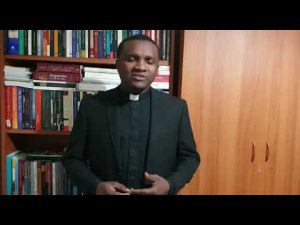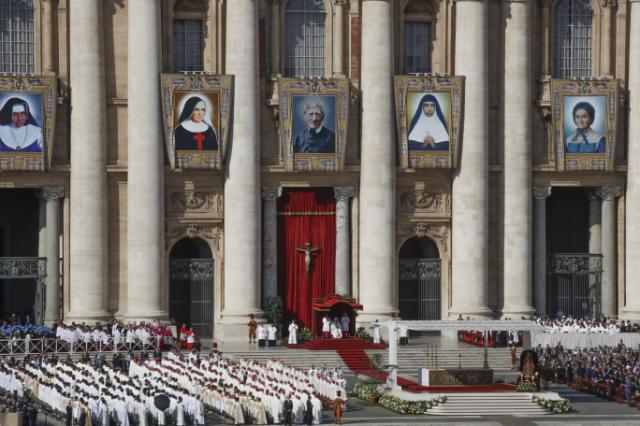By Fr George Adimike
A proper understanding of the Church wrestles with historical and theological complexities that underscore her nature as a mystery in history. Without going into such complex issues, suffice it to say that fundamentally the Church is about Christ. Hence, a Christless Church is as absurd as a Churchless Christian.
In response to the lockdown occasioned by COVID-19, Christian Churches translocated their worship online. The decision to suspend public religious assemblies momentarily, which caused discontentment and confusion to many Christians, offered some a needed alibi to attenuate the value of Sunday worship assembly. They questioned the rationale behind the insistence on Sunday worship attendance since technology provides an alternative way of worshipping.
Consequently, the weakness of the faith of some Christians became evident in their positions. In their estimation, true worshippers do it in Spirit and in truth (cf. John 4:23), after all, religion is in the heart (uka di n’obi). As a result, the Church needs to adapt to modern development. This position runs contrary to ‘what it was to be’ Church and demonstrates a superficial appreciation of her mission. In any case, an adequate understanding of the mystery of the Church arrests this challenge by clarifying her true identity.
From whatever perspective (biblical, theological, spiritual, anthropological, sociological and eschatological), the Church is a body. She is the body and bride of Christ (cf. 1 Cor. 12:12-14; 2 Cor. 11:2-4; Eph. 5: 22-33); the assembly of believers, the body of the people of God, the temple of the Spirit, a communion. Presence underscores these expressions of bodiliness as an essential factor.
The Church needs real presence to be Church such that being the Church and going to church are not mutually exclusive. From the perspective of spirituality, being and doing are not separated. It is in doing that being is expressed – going to church is essential to being part of the Church such that absenting oneself from the assembly of the faithful contravenes God’s law (cf. Heb.10:25).
In that case, appealing to the alibi of the Church in the heart manifests extreme lack of knowledge of the corporate nature of the sacred communion, the Church. As the communion of the saved and instrument of salvation and fellowship with all creation, this divine project serves man’s ultimate purpose.
The weekly Christian worship, in a special way, demonstrates this corporate nature by our prayer patrimony, “Our Father”, for the Church offers us the opportunity of assuming the filial relationship within fraternal context. The Church significantly demonstrates human inter-subjectivity. She is always a relationship of “I with You” and the “You” is Christ but since Christ comprises of all he saved, the Church is an encounter of “I” with “totus Christus”(whole Christ) and not “solus Christus” (solitary Christ). The “whole Christ” is a corporate concept of Christ the head with the faithful.
Arguably true, the Church is the most significant possibility of assumption and expression of our identity as humans. It resonates with the core of our beings expressing both dignity and indigence all at once and letting our poverty encounter the greatness of Christ in whose providence we thrive.
In the Church, our brokenness meets our nobility in Christ and submits our poverty to God’s greatness, who by his providence takes over our cares and concerns. Our self-reserving, self-referential, self-congratulating and self-idolatrous obsession makes us feel at the centre of the universe. However, at worship, we begin a journey of self-discovery, which is a real exodus of self-giving that courageously opens us to the reality of what life is and offers. It helps us to see in the entirety of the community the meaning of communion in Christ.
The gathering expresses the human dimension of the Church; the concreteness of the assembly makes it evident that the Church is not just a spiritual reality or amorphous entity not instantiated in‘re’. Each gathered assembly (the ekklesia of God) is the point of contact that opens up to all other so-gathered communities for the spiritual communion given by God. The disciples gathered in the upper room before the Holy Spirit came upon them and constituted them into a Church (cf. Acts 2).
The Church of Christ is neither just an invisible spiritual reality with no “fundamentum in re” nor only a visible physical entity; she is a “both … and” inclusive project of the Father. The Body of Christ is a mystery symbolically expressed both in spiritual and physical realities with a permanent foundation in Christ by the Spirit.
For the Church to be consistent with her symbolic nature respecting its various ramifications, she has to be concretely present and encountered. By way of analogy, since there cannot be a marital act without the physical presence of the couples irrespective of whatever assistance the digital operation offers, so also regardless of the digital support in times of extreme necessities, there cannot be Church properly so-called without the physical presence of the assembly. This concrete presence symbolizes a mystical communion. In consequence, sacraments (Confession, Chrismation, Eucharist, Marriage, etc.) are not administered online.
While digital technology creates new relations, communities and cultural praxis that impact the general cultural practices of a people, these realities are, notwithstanding, offshoots of the existing cultures. The digital anthropology is embedded in the science of man.
It cannot be disconnected from anthropology, which funds its development in its study of the socio-cultural phenomena within the digital interactive space. As such, a people’s appreciation of religious worship or sacred mysteries will impact how they treat them relative to the online possibilities. This anthropological disposition funds perspectives and conceptions of faith expression.
Worthy of note is that, as the digital technology offers assistance to physically absent couples to sustain their conjugal love, it will in no way replace the physical presence or diminish its value. In truth, the online reality sustains the desire for communion, creates and raises their expectancy, arouses their hunger for each other as an appetizer and stirs joy for their physical meeting.
Yet the Internet is never a substitute for real presence in any conjugal relationship, be it between humans or bridal relationship of the Church with Christ (cf. 2 Cor. 11:2-4; Eph. 5:22-33; Rom. 7). How can there be a conjugal relationship without the real presence of the bride; how can there be a Church without the actual presence of the gathered assembly?
In the sacred bridal interconnection with the divine Groom, the assembly becomes the real presence of the bride ready for the encounter with the Groom by the Spirit. This assembly that is a communion of shared beliefs and “becomings” relives the experience and whets her appetite for the real stuff on the marriage feast of the Lamb on the last day (cf. Rev. 19:7).
Unfortunately, our desire for autonomy from the authorities does subtly make us promote online liturgy instead of onsite worship. The member-shopping drive where some target a select number of elite or middle-class faithful, who are religiously faithful to the online offertory, digital tithe and online harvests, aggravates faith crisis. Ecco! The temptation to these can make us not to explain to people the difference between the ad hoc and extraordinary online liturgy and the weekly onsite worship. Such a lack of profound Catechesis atrophies the faith of the faithful at the onsite worship.
Properly speaking, going to the Church is like expressing the pilgrimage nature of life. Since life is a journey, then attending Sunday worship puts the inner stir in active mode. It is a refusal to be destitute and deity at the same time. God, who in his all powerfulness could save humanity by his Word or by willing it alone but chose the human way of encounter (bodily process), wants us to meet. He invites us to meet as a people called by his name (cf. Matt. 18:20). The Church is, therefore, a mystery of corporate existence, which abhors individualism or lone-ranger spirituality.
Finally, faith has both private and public dimensions. The public aspect not only implicates the need for public witnessing but also finds concrete expression in liturgical gatherings of Christ’s faithful by which the Church as a mystical body and community of believers is specially demonstrated.
There is no gain writing it in capital letters to make the point that privatizing the faith can only atrophy or kill it. To see digital connection with faith community, which online worship fosters in the face of the pandemic, as a replacement for the incarnated, mystical and sacramental communion which onsite worship enthrones would play into the hands of those who want the demise of the Christian faith.
The Tele-Church does not represent the ekklesia of Christ and does not suffice for Weekly Eucharistic assembly because a Tele-Eucharist fails the Incarnation criteria. Similarly, there is no ekklesia on the Internet, rather virtual worship can serve as “praeparatio evangelica” and indeed, “logos spermatikos”, seeds of grace that prepare the faithful for an encounter with the whole Christ (totus Christus), which the Sunday liturgical assembly represents. The reality of the onsite worship spells the nature of the Church such that in moments of emergency, online worship serves only as a support and not a substitute.

findfadachigozie@gmail.com














